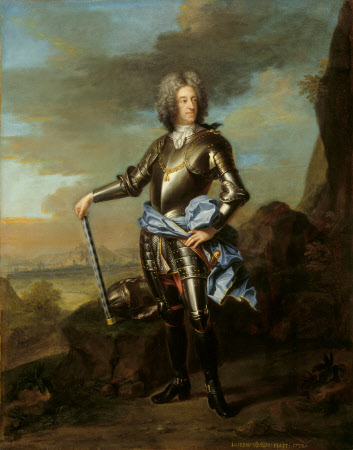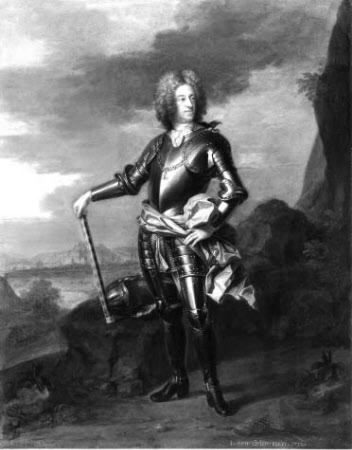The Elector Max Emanuel of Bavaria (1662-1726), as Governor of the Spanish Netherlands
Joseph Vivien (Lyon 1657- Bonn 1734)
Category
Art / Oil paintings
Date
1712 (signed and dated)
Materials
Oil on canvas
Measurements
629 x 502 mm (24 3/4 x 19 3/4 in)
Place of origin
Germany
Order this imageCollection
Attingham Park, Shropshire
NT 609123
Caption
Maximilian II was the son of the Elector Ferdinand Maria of Bavaria (1636-1679) and Adelheid Henriette of Savoy. He became Elector in May 1679 and was deposed in 1706, restored in 1713, and remained Elector till his death in February 1726. As this portrait attests, he was a brave and able soldier, and displayed his prowess early by his daring capture of Belgrade from the Turks in 1688. He later fell victim to his own ambition and schemed to obtain the Spanish, Polish and Imperial crowns with the alliance of France. He was deposed after the Battle of Blenheim but was restored under the Treaty of Utrecht. He was one of Europe’s greatest collectors of works of art, with arguably the largest, richest and most magnificent collections in all Europe.
Summary
Oil painting on canvas, The Elector Max Emanuel of Bavaria (1662-1726), as Governor of the Spanish Netherlands, by Joseph Vivien (Lyon 1657- Bonn 1734), signed and dated, bottom right: JOSEPH•VIVIEN•FECIT•1712. A full-length portrait, almost in profile to the left, head turned to right and left hand resting on baton. He is wearing a suit of armour, a blue sash tied around waist and a grey wig and standing in a landscape setting. Son of the Elector Ferdinand Maria of Bavaria (1636-1679) and Adelheid Henriette of Savoy. Became Elector in May 1679 and was deposed in 1706; restored in 1713 and remained Elector till his death in February 1726. He was a brave and able soldier, and displayed his prowess early by his daring capture of Belgrade from the Turks in 1688. He later fell victim to overweening ambition and schemed to obtain the Spanish, Polish and Imperial crowns with the alliance of France. He was deposed after the Battle of Blenheim but was restored under the Treaty of Utrecht. His son The Elector Karl Albrecht (1697-1745) achieved the Imperial crown sought by his father. Max Emanuel married in 1685 as his first wife Maria Antonie (d.1692) the daughter of the Emperor Leopold I of Austria (1640-1705) and then in 1695 Theresa Kunigunde (d.1730) daughter of Jan III Sobieski, King of Poland, (1629-1696). He was one of Europe’s greatest collectors of works of art and Father Pierre de Bretagne said in 1722 that the greatest connoisseurs of the time considered the Munich collections to be the largest, richest and most magnificent in all Europe. He commissioned the building of the Neues Schloss, Schleissheim, Bavaria
Provenance
Isolde Wigram collection; a gift to the National Trust from Miss Isolde Wigram, 1991.
Marks and inscriptions
Property of Mrs Wigram, 39 Lennox Gdns, SW1 National Trust from Mr French, 39 Lennox Gdns (paper labels on reverse)
Makers and roles
Joseph Vivien (Lyon 1657- Bonn 1734), artist

